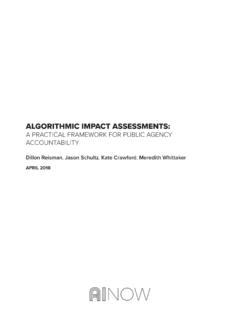Transcription of HistoryToday.com The Reforms of Tsar Alexander II
1 Reforms of Tsar Alexander IICarl Peter Watts examines a set of Reforms which held out the prospect of modernising Russia but whose failurepaved the way for II s great Reforms stand out as among the most significant events in nineteenth century Russianhistory. Alexander became known as the Tsar Liberator because he abolished serfdom in 1861. Yet 20 yearslater he was assassinated by terrorists. Why did Alexander introduce a programme of Reforms and why did theyfail to satisfy the Russian people? This article will demonstrate that the Reforms were a direct response to Russia sdefeat in the Crimean War. They were intended to liberate Russian society from some of its most archaicpractices, improve the economic and military efficiency of the war and preserve the existing socio-politicalstructure by a process of modification.
2 The essentially conservative nature of Alexander s Reforms is betrayed bythe continuity in policy from the reign of his predecessor Nicholas I (1825-1855). Yet this conservatism, far fromguaranteeing the safety of the aristocracy, jeopardised the stability of Russia because it left a 50-year legacy ofsocial and political dissatisfaction to Alexander s : The Fundamental ReformThe need for reform was evident well before the reign of Alexander II. The Decembrist Revolt of 1825 occurredjust as Nicholas I acceded to the throne. Although it was unsuccessful, the uprising demonstrated that theautocracy could not continue to ignore demands for reform indefinitely. The condition of the peasantry wasperhaps the most prominent weakness in Russian society.
3 The Pugachev Revolt (1773-75) had served as areminder of the threat that a dissatisfied peasantry could represent. Nicholas I introduced a series of minorreforms which improved the conditions of state and crown peasants and which were intended to serve as a modelto the dvoriane (nobility) as to how they should treat their private serfs. Most landowners, however, took littlenotice of these measures and continue to extract feudal dues and labour services from their serfs without regardfor their welfare. It is clear that Nicholas I abhorred serfdom: in 1842 he declared to the Council of State: Therecan be no doubt that serfdom in its present situation in our country is an [It] cannot last forever .. The onlyanswer is thus to prepare the way for a gradual transition to a different However, the conservatism of theautocracy was such that it would not compel the dvoriane by abolishing serfdom unilaterally.
4 It took the shock ofRussia s disastrous performance in the Crimean War, the concomitant death of Nicholas I and the accession ofAlexander II to alter the II had served on the committees of inquiry into serfdom and he was acutely aware of the weakness ofthe Russian state. Defeat by Britain and France now demonstrated that Russia was lagging behind her Europeancounterparts. In the autumn of 1856 Yuriy Samarin, a prominent Slavophile, articulated the concerns of politicalsociety when he wrote that 'We were defeated not by the external forces of the Western alliance but by our owninternal weakness.' Criticisms of serfdom were echoing from many quarters. General Dimitry Milutin, later Ministerfor War (1861-1881), advised the new Tsar that reform of the Russian army was impossible while serfdomcontinued to exist.
5 Only by reforming the very foundations of Russian society could effective military capacity berestored and great power status recovered Serfdom was also condemned as economically inefficient. K. , a liberal university professor, wrote a critique of serfdom in 1856 in which he observed that 'In theeconomic sphere, serfdom brings the whole state into an abnormal situation and gives rise to artificial phenomenain the national economy which have an unhealthy influence on the whole state 'organism of the state . It wasargued that serfdom impeded the emergence of a modern capitalist economy because the existence of aninelastic labour force and the absence of a money economy retarded industrial development It was further arguedthat serfdom was an inefficient and unproductive form of agriculture because, essentially, it was forced labour, andso the serfs had no incentive to do any more than these powerful arguments in favour of abolishing serfdom, it was still difficult for Alexander II to overcomethe inertia of the dvoriane on the issue The Tsar had to conjure up the spectre of widespread peasant revolt inorder to persuade his reticent nobles that there was no alternative to Emancipation.
6 In a speech to the Tvernobility, he declared that 'It is better to abolish serfdom from above than to wait for the time when it begins toabolish itself from below.'Emancipation: A Flawed MeasureThe Edict of Emancipation was promulgated in March 1861. Serfs were freed from their feudal obligations andallotted land for their needs. landlords received compensation from the state in the form of Treasury bonds. Thepeasants were then indebted to the state and obliged to make redemption payments to their obshchina (the villagemir, or commune) over a 49-year period. Peasants were incredulous that they had to pay for the land which theythought belonged to them because they had always worked it. Many, believing that the real terms of theEmancipation had been concealed by their landlords, rioted in Emancipation was certainly effected on extremely onerous terms for the peasantry.
7 They lost, on average, cent of their pre-1861 agricultural holdings. In the more fertile regions of the Empire the situation was farworse, in the Steppe provinces, for instance, the figure was per cent, and in the Ukraine peasants lost cent of their former land. The fundamental problem was that there was not enough good quality land availablefor distribution. Even the nobility failed to benefit from Emancipation, despite the care that the government hadtaken to protect their economic interests. The dvoriane was so heavily indebted that the financial compensationreceived was in general swallowed up by the settlement of debts. There was, therefore, little investment inindustry and agriculture following Emancipation, and the persistence of obsolete agricultural techniquesexacerbated the central problem of low yield.
8 Russia produced six hectolitres per acre of cereals at this time,compared with over nine in France and Prussia, and 14 in Britain and was a medieval method of social control upon which the autocracy was and nobility had become government sought to perpetuate a similar level of control after 1861. The terms of the Emancipation dictatedthat local obshchina should control the movement of peasants in their district, so that those who wanted to travelmore than 20 miles required an internal passport. There has been some controversy among historians over theeconomic effects of these restrictions. Alexander Gerschenkron, for example, argued that it contributed towardsthe retardation of Russian economic development by preventing the emergence of a freely mobile labour also observed that the economy was affected by the diminution of peasant purchasing power as aresult of the redemption payments.
9 Falkus, however, suggested that because internal passports were issuedin large numbers and, further, there were between 2 and 3 million peasants who did not have any land afterEmancipation, there was a pool of available labour. Falkus also noted that because the redemption paymentswere spread over a long period, they were in many cases no higher than the rents which former serfs had paid totheir landlords. Nevertheless, it is clear that the abolition of serfdom did not facilitate the optimum conditions forRussia s economic : A Humanitarian Reform?The failure of Emancipation to achieve any real economic benefit is offset by some historians who portray theEdict as a moral improvement. Anderson, for example, contended that the grant of individual freedom and aminimum of civil rights to twenty million people previously in legal bondage was the single greatest liberatingmeasure in the whole history of Europe.
10 Emancipation was certainly a significant event for the Russian serf,because as a free peasant he was able to marry without the consent of a third party; he could also hold propertyin his own name; he was free to take action at law; and he could engage in a trade or business. Above all, hecould no longer be bought or sold and it should not be overlooked that it took four years of bloody Civil War inthe United States (1861-65) to afford the American negro slave this dignity. Nevertheless, the morality ofEmancipation should not be allowed to obscure the realities behind it. The injustice in Russian society had longbeen criticised by radical intellectuals like Radischev, Pushkin, Turgenev and Herzen; but such moral criticism hadlittle impact on the autocracy.








